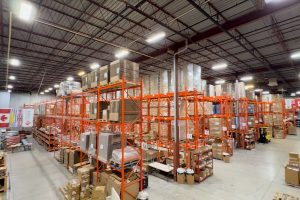No doubt about it, selling and shipping your products to consumers in the Canadian marketplace can be very profitable. But what is important to factor in is the sheer size of the country. The vast Canadian landscape poses a logistical challenge, to say the least. That being said, InterFulfillment is the Canadian eCommerce order fulfillment expert, and we have experience not only shipping products across the country, but also advising eCommerce merchants on how to avoid the pitfalls of direct-to-consumer (D2C) shipping to remote locations across the country. There is a lot to cover so let’s get into it!
Do Not Offer Free or Flat Rate Shipping to Canadian Customers
Many eCommerce merchants enter the Canadian market after experiencing success in the United States. One of the go-to strategies for increasing sales is offering customers free or flat rate shipping. We strongly advise our merchants against it. Although it may work perfectly in the USA where the USPS offers various flat rate shipping boxes, that is not the case in Canada. Most of the Canadian population resides in greater metropolitan areas along the southern border. To put it in perspective, shipping to an address in a remote location can cost 10 or even 20 times more than shipping to one of Canada’s population centers. This means although you may have no problem providing free or flat rate shipping to one Canadian customer, another may cause significant losses.
Canadian Consumers Are Accustomed to Paying for Shipping
You read that correctly. Canadian eCommerce consumers are some of the savviest in the world. When they shop online, they understand the logistical challenges of their national landscape and are prepared to factor in shipping costs. While a customer in the United States may simply opt not to order if there are any shipping charges on their orders, that is not the case for Canadians. Although as an eCommerce merchant you may be hesitant to charge D2C shipping because you are concerned it will hurt your sales or conversion rates, you can rest assured that Canadians are ready and willing to pay fair shipping for your products.
You Can Use Postal Codes to Determine Whether an Address is Remote
The Canadian postal code system is unique. Although if you are not familiar with it, it may seem confusing at first, it really is not. It is very telling of where the address is located and can be an extremely useful tool to navigate successful D2C shipping to remote locations across Canada. Here is a quick overview. Each Canadian address has an assigned postal code. Postal codes consist of three digits and three letters. For this example, let’s use the postal code of one of our InterFulfillment facilities, which is not remote. This warehouse is located in the Greater Toronto Area (GTA) which is actually the most densely populated. The postal code is M1X 1C2. OK, so what does that mean?
Well, at a glance you can see that by the postal code we are not in a remote location. You may be wondering how. If we were in an extremely remote location (which costs way more to ship to) our postal code would have a 0 as the second and last character. Basically, a typical remote location postal code would look something like this M0X 1C0. You can get a full rundown of Canada Post Air Stage Office postal codes here. As you can see all the postal codes listed follow that same rule.
Don’t Offer Shipping to Remote Locations
A simple option to avoid massive losses when D2C shipping in Canada is simply not shipping to remote locations. To put it in perspective, 90% of Canadians live in densely populated areas. This accounts for an even larger amount of eCommerce consumers. This means that not only will you be avoiding D2C shipping losses, but you would be missing out on a very small amount of sales. We recommend doing this as the simplest possible solution. InterFulfillment has absolutely no control over what carriers charge to deliver a parcel. We have no way of mitigating the costs of shipping to remote locations for our customers. Remember, the order fulfillment services associated with D2C orders don’t change depending on where your package is going. Only the carrier costs.
Unless you want to lose money, you need to adjust your shipping policies to address remote shipping in Canada. Many eCommerce merchants even set up scripting in their checkout process that actually does not allow remote orders to be processed at all.
Size and Weight of Your Parcels is a Major Factor
D2C shipping to remote locations is particularly costly if you have larger or heavier products. This increases the costs exponentially as you can imagine. It affects every aspect of the carrier shipping costs. Fuel Surcharges, Domestic Delivery Area Surcharges, and other variables. This is why carrier costs for shipping larger packages to remote locations are impossible to ignore. The losses you can sustain by not taking them into account are dramatic, to say the least. Make absolutely sure that you have measures in place to ensure your order doesn’t get processed without examining the shipping costs and reaching out to your customer to ask if they would still like the order when factoring in the shipping cost associated with it.
Conclusion
There is no doubt about, selling and shipping your products in the Canadian market can be very profitable. Canadians love to shop online. But as merchants, it is critical that you understand the Canadian landscape to avoid the ridiculously high costs of shipping to remote locations. Remember, if you simply refused to ship to remote locations you would only be missing out on a very small portion of Canadian consumers. This is a viable option. That being said, if you want to serve everyone, make sure you have measures in place to charge the appropriate shipping. As a Canadian 3PL provider, InterFulfillment certainly hopes this article and the document we have provided in it are helpful. The last thing we want is for eCommerce merchants to experience losses and have a negative experience shipping in Canada.












